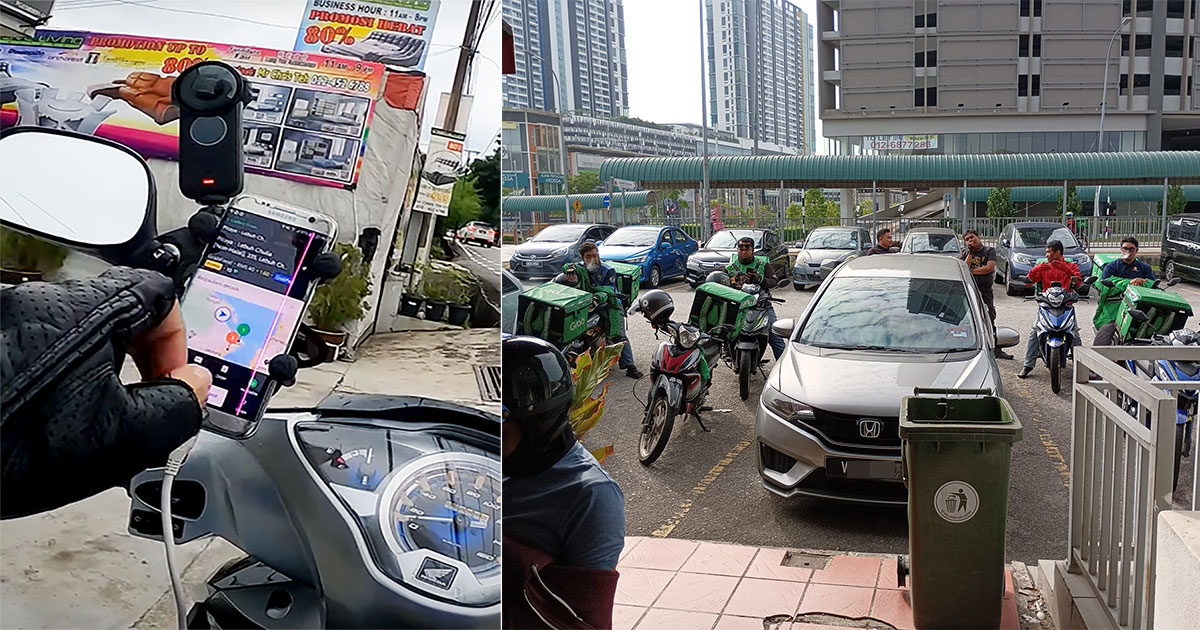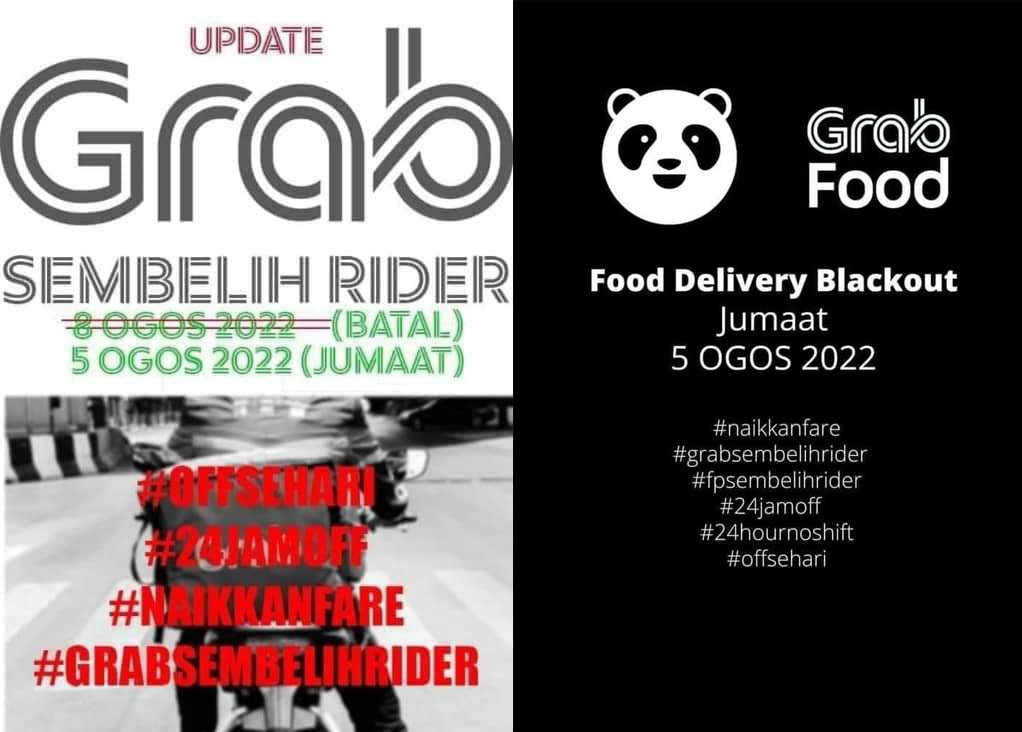Follow us on Telegram for the latest updates: https://t.me/mothershipsg
Food delivery riders in Malaysia, mostly those utilising Grab and foodpanda apps to make a living, are on a 24-hour strike on Friday, Aug. 5, 2022.
Dubbed "Food Delivery Blackout", the nation-wide collective action by the gig economy workers is to protest low delivery fees, as well as to call for better social security and protections.
RM5 per order earnings
Currently, food delivery riders are reportedly paid a flat rate of RM5 (S$1.55) per delivery and may earn incentives depending on the time and distance of the order placed.
As recent as July 2022, it was revealed publicly that individual job earnings have been slightly higher than RM5 per delivery, with bonuses that range from 30sen to a few ringgit per job.
However, riders are said to be compensated unfairly overall for deliveries that may take a longer time to complete.
Due to circumstances, such as jams or slow merchants, order delivery time might be prolonged, but riders will still be paid a flat fee, and can suffer from negative reviews and poor ratings, which could affect future jobs allocated to them.
As a result of these factors, which riders feel are causing them to bear the responsibility of reduced takings in the face of growing inflation, more deliveries per day need to be completed just to meet income targets.
A food delivery rider in Malaysia can earn between RM50 (S$15.49) to RM100 (S$30.98) per day, depending on the hours worked.
Malaysia food delivery riders have to pay out of pocket to contribute to their social security fund.
Better model proposed
These issues were hashed out by Abdul Hakim Abdul Rani, the vice-president of Malaysian P-Hailing Riders’ Association (Persatuan Penghantar P-Hailing Malaysia), who also clarified that the non-governmental organisation did not initiate the strike, but understands where the riders are coming from.
He added that his NGO has proposed to introduce a standard rate of RM5 (S$1.55) for the first 5km per delivery and 80sen (S$0.25) should be applied for each subsequent kilometre.
It has been estimated that a RM5 (S$1.55) delivery fare would usually take around 15 to 20 minutes to complete, including pick-up time.
One suggestion is to increase the earnings to RM1 (S$0.31) per minute, effectively allowing riders to earn RM25 per delivery.
Strike cooridinated via social media
The one-day strike has become the talk of riders on various Facebook groups with hashtags #OffSatuHari, #24hournoshift and #naikkanfare being associated with the event.
Based on guesstimates, not all food delivery riders are out on strike as those with families and urgent needs will still take to the roads.
Some 40 per cent of riders are still expected to go to work.
Online chatter have been warning that food delivery could take longer than usual on Friday, which is a peak period day.
Collective bargaining and negotiations
In one Facebook group, a pro-strike commenter said there will be no action taken against those who sit out and leave their apps turned off on Friday as there is no way the food delivery companies can know for certain who was really participating in the strike and who was merely taking a day off to rest.
This rationale highlighted an issue with the gig economy, where anyone who works for a platform is categorised as a contract worker or freelancer instead of an employee, and power negotiations can be easily reversed via collective action that leaves the platforms scrambling to mitigate impending manpower disruptions that have downstream effects on customers.
Platforms address strike issue
A day before the planned strike, foodpanda sent out an email to its partners on rider availability for Aug. 5, stating that it is "actively working on mitigating the situation as effectively as possible".
Grab in Malaysia reportedly did not comment directly on the strike issue beyond sharing a statement that was given to rider-partners to clarify a misunderstanding regarding its minimum fare rate on July 21.
It explained that the minimum fare rate is unchanged and has not gone down to RM3 (S$0.93) as stated in a screenshot that was circulated widely in Malaysia, which likely sparked the backlash.
It said the mistake in the calculated fare rate was due to a technical issue and those affected have been reimbursed.
It was reported that Grab Malaysia did say it was this discrepancy in riders' earnings that had sparked calls for a strike on Aug. 5.
Protest press conference
In the latest update on the strike in Malaysia, the matter has turned political, with a press conference fronted by food delivery riders and the opposition Parti Keadilan Rakyat (PKR).
Exact figures regarding the number of riders on strike were not given, but the process was described as "happening nation-wide".
The press conference touched on food delivery gripes, such as describing it as "modern slavery" where riders have to adhere to the rules of the platform, which are onerous and can be unfair.
One example raised was the discrepancy in the distance of deliveries as reflected on the maps of food delivery apps versus Google Maps or Waze.
The food delivery apps would show the distance as being much shorter than on the other apps, rendering fees paid out lower.
Another major gripe is on how food delivery riders feel they bear the brunt of faults in all circumstances, such as when there are delays due to bad traffic conditions and foul weather, as well as when customers are mischievous, unreasonable or even downright fraudulent.
Such situations with customers arise when the wrong address is given resulting in unfulfilled orders, cash on delivery orders that are not honoured with proper payment, and the practice of always blaming the rider for minor grievances.
Top photos via KeithOnTheBike YouTube & Sunan Musafir
If you like what you read, follow us on Facebook, Instagram, Twitter and Telegram to get the latest updates.

